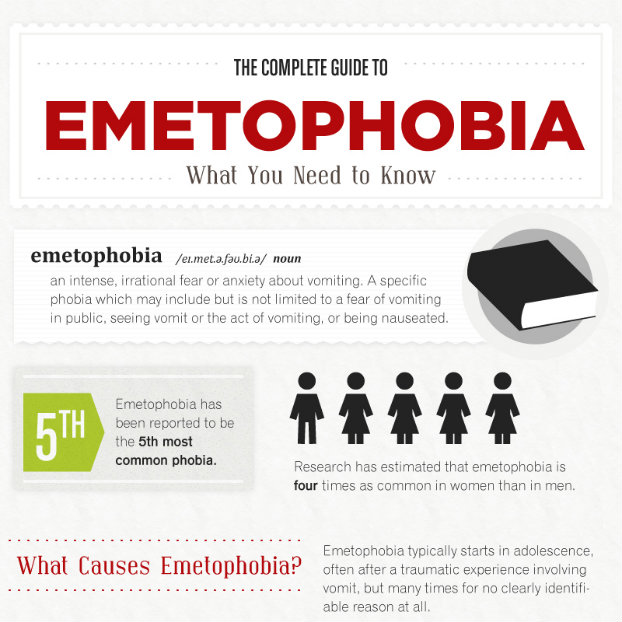 Ahh, great expectations. They are the things that help us reach for the highest heights and help us attain supreme levels of bliss, yes?
Ahh, great expectations. They are the things that help us reach for the highest heights and help us attain supreme levels of bliss, yes?
Not so fast. In fact, expectations can be quite dangerous for your emetophobia, as well as your overall mental health. They have the power to make you miserable, squash the joy of any given experience, worsen your fear of vomit and set up resentments.
What They Are
It’s first important to point out the difference between expectations and goals. Tempering your expectations doesn’t mean you should throw out that five-year career plan or that 10-year plan for paying off your mortgage. Those may be concrete goals for which you have created an equally concrete way to move toward attaining them.
Expectations, on the other hand, are more like dreamy little thoughts that you hope will come true as you meander in willy-nilly in their general direction (or not).
You can further explore the difference with regards to your emetophobia.
- Goal: I am hoping to decrease the severity of my vomit fears by taking advice from my therapist and perhaps trying a new program designed to help emetophobics.
- Expectation: My emetophobia will be completely lifted by next Thursday.
Business guru Jeff Kaplan further explains goals help people define what they want while expectations are “…a formula for disappointment and sometime even disaster.”
What They Can Do
You may not have to kill off expectations altogether, as realistic expectations do have a link to happiness. Unrealistic expectations, however, have the power to pretty much land you in the gutter.
“American’s high expectations of success have been suggested as a major contributing factor to both unhappiness and a high rate of mental illness,” according to marriage and family therapist Dr. Randi Fredricks.
She cites a study that looked at mental illness rates in more than 60,000 homes across 14 countries and found America as clearly the leader of the mental-illness-rate pack. The U.S. clocked in with a 26.4 percent mental illness rate, compared to the lowest rate of 4.7 percent found in Nigeria.
More than half the countries had a mental illness rate of higher than 10 percent, and the most prevalent illness found everywhere except in the Ukraine were anxiety disorders. Yes, vomit fears and other phobias neatly fall into the anxiety disorder category.
Researchers linked the high rates of anxiety disorders to the high expectations of success many Americans harbor, a set-up that results in frustration when those expectations cannot be met.
Great expectations indeed.
While the statistics are well and good to back up the fact that your expectations can be contributing to your overall misery, you can go one better by checking out how expectations can impact your daily life.
Expectations’ Impact on Daily Life
Contribute to Misery
Let’s say for whatever reason you set up an unrealistic that your ongoing fear of vomit will somehow be alleviated by next Thursday. Thursday comes and you wake up with glee, as this is the day you will no longer be suffering from emetophobia. Whee!
As the day goes on, however, the same fears start creeping their way in. By the end of the day you have noticed no change in your fear levels whatsoever. While this alone may enough to make you unhappy, you can compound the misery with self-pity, despair and piling on a host of other things you think are wrong with your life, creating a giant snowball effect of anguish.
Not only are your vomit fears still hanging around despite your great expectations, but you can easily add other agonizing thoughts:
- Nothing will ever make the vomit fears go away
- Why am I stuck suffering from this phobia
- Why can’t I just eat at a buffet like other folks
- Why did I get this stupid haircut!
Squash the Joy of Any Given Experience
Let’s say you have tickets to a ballgame. Instead of simply going to the game and enjoying the experience, let’s also say your brain starts setting up expectations the moment you have the tickets in hand. You expect your team to win, of course, and you also expect the weather will be perfect for playing ball. You expect your best friend to come with you, even though you never asked in advance, and you expect to get a great deal on peanuts, popcorn and Cracker Jacks.
You get to the stadium. It’s raining. Your friend couldn’t make it since he had made plans that weekend. Your team loses. The stadium vendor was out of Cracker Jacks!
Thus the whole ballgame experience really stank, yes? But it didn’t have to. It only stank because you had already painted a picture of what you expected it to be like. When the experience didn’t meet your preconceived picture, you automatically gave the whole deal a giant thumbs down.
Worsen Your Fear of Vomit
Phobias actually stem from expectations, with the expectation that something “bad” will happen when you’re confronted with whatever you may fear. You can end up worsening the fear not only by expecting more horrific outcomes every time, but by increasing your anxiety levels in general.
As noted in our post Making Time to Relax to Alleviate Anxiety, piling up a laundry list of unattainable expectations throughout your day, or even your entire life, can only serve to make anxiety worse. Increased anxiety results in increased fears and, voila!, your emetophobia just got worse.
Set up Resentments
Remember that friend you thought would be thrilled to go to the ballgame with you but he couldn’t? To top it off, he didn’t even seem excited that you bought surprise tickets. The jerk. You don’t need him as a friend, anyway, especially since he wouldn’t rearrange his life to come to the ballgame with you.
A resentment is born and a friendship possibly destroyed all because of your expectations.
So be wary when these little things called expectations start worming their way into your head, as they can come with disastrous results. Instead try enjoying whatever is in front of you without any preconceived notions of how it should be – and go for realistic, concrete goals you can reach in an equally realistic manner.
SOURCES:





